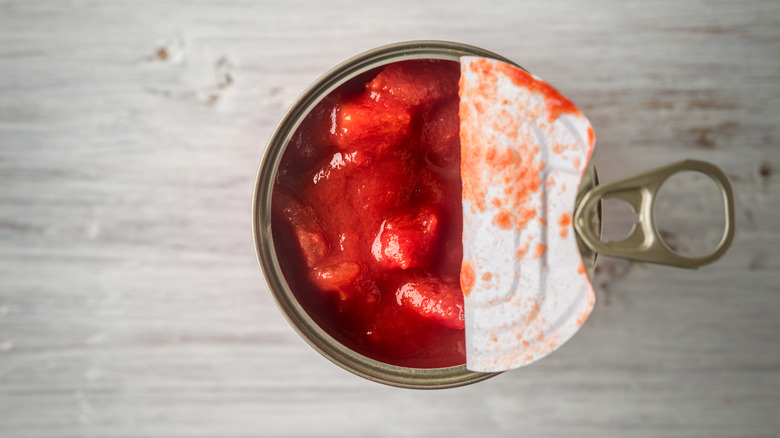Why It's Not Always Best To Substitute Canned Tomatoes With Fresh
Great to keep on deck for your next pizza night or soup session, there are many reasons why you should keep canned tomatoes in your pantry. When choosing a kind of canned tomato, variety is key. Different recipes call for diced, whole, or crushed, among other modes. No matter which kind you go for, make sure to hang onto the tomato's liquid since this can take your dish's flavor up a notch. You'll likely only need the tomatoes for a given recipe, but the residual liquid works well as an addition to soups or stews.
Despite the variation in canned tomatoes, the preparation of each kind begins similarly. Per Simply Recipes, canned tomatoes start with ripe plum tomatoes that are then peeled, cooked, and processed accordingly. This is where the commonalities typically end. Different can brands, not to mention various forms of tomatoes, may include more or fewer ingredients and steps. You can find cans that contain nothing more than tomatoes and their juice and those that are more complex, consisting of seasonings like garlic and basil.
In general, however, canned tomatoes are fairly similar, and though they may seem interchangeable with fresh ones, that's not always the case. According to The Spruce Eats, swapping out the canned version for the real deal may actually result in a less flavorful outcome.
Fresh tomatoes from the grocery story may come underripe
It's easy to assume that the newly picked version of any food always surpasses the canned iteration. Fresh tomatoes can work in lieu of canned tomatoes — but with the caveat that they're ripe and ready for consumption, per The Spruce Eats. Ripeness seems like a typical thing to expect from your fresh produce, but it's typically not the case for supermarket tomatoes.
Chatelaine states that grocery store tomatoes are often bland, as they're picked while green and firm to ease transport to stores. The tomatoes you then see, buy, and eat are usually picked too early and, therefore, not as flavorful for eating and cooking. While tomatoes can certainly soften and change in texture after being picked, they no longer develop in flavor once taken off the vine.
Meanwhile, canned tomatoes are consistently picked only once the fruit has ripened. Therefore, they have a more developed flavor and are the better option of the two for any time of the year, per The Spruce Eats.
Compared to fresh ones, they're also higher in lycopene, a nutrient that helps fight against different forms of cancer and is responsible for giving tomatoes their rich color. Not that fresh tomatoes don't provide similar benefits; canned ones just have more that are readily "available to the body" (via Food Network).
As such, it's better to save for fresh tomatoes whenever the fruit is in season. What better excuse to hit up your favorite farmstand than for newly ripe flavor?

